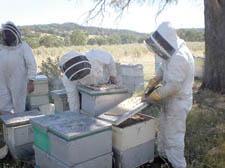|
|
 |
| |

Bee-keepers in a scene from The Vanishing of the Bees |
Plight of the bumble bee sounds alarm
THE VANISHING OF THE BEES
Directed by George Langsworthy and
Maryam Henein
THIS film about the plight of the honey bee is carefully put together, thoughtfully argued and with shocking information to impart, telling the story of how bees around the world are literally deserting their colonies – and the impact this has on agriculture. It has a plot straight from the wildest of science-fiction fantasies.
Littered with talking heads, including some wonderfully eccentric bee experts, the story is laid out in a straightforward and easily understandable manner.
And while the facts are shocking – bee populations in the past couple of years have collapsed, and the knock-on effect of this will have dire consequences for our ability to grow crops – there is a silver lining. If we promote non-industrial agricultural techniques such as proper organic and bio-dynamic farming, bees will prosper once more. It is that simple.
There is a vogue to create hard-hitting nature documentaries about the threats we collectively face, from Al Gore’s An Inconvenient Truth to Franny Armstrong’s Age of Stupid, the fishing disaster movie End of the Line and now this, a comprehensive look at the disastrous collapse of bee colonies and what this means. Cinema-goers are providing a fertile ground for eco-arguments.
Bees are, according to this movie, like pithead canaries – their health is intrinsically linked with the state of the planet, and therefore we all should worry about their ordeal.
Speaking to the New Journal, director George Langworthy said he had been attracted to the story by its worldwide reach. “I’d been considering making a feature-length documentary for some time and then a friend was telling me about bees,” he said.
“I looked further into it and realised this was a global issue, a compelling story, and one I had to cover.
“I was particularly drawn in by the fact it encapsulates all these different issues – agriculture, politics, the economy. So much is there.”
Langworthy added that people in the “bee community” were compelling subjects: “I got to meet these guys who are bee-keepers, and they themselves are fascinating – they are all closet philosophers, bearded DIY individuals with stories of their own to tell.”
While the film itself is incredibly worthy and features some hugely interesting characters, for someone who has been brought up on a diet of David Attenborough films, it lacks quite the sparkle of such a Natural World narrative. But this grumble about film-making techniques should not detract from what is another hugely important film on a topic we simply cannot ignore.
• |
 |
|
 |
| |
|
 |
|

